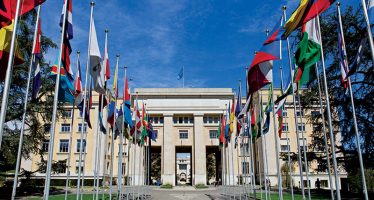United Nations Office for Project Services (UNOPS): Sustainable Results in Challenging Environments

Myanmar
From building shelters in Haiti or helping to improve the school system in South Sudan, to buying medicines in Myanmar or equipment for clearing the snowy passes of Afghanistan – UNOPS provides sustainable infrastructure, project management and procurement services in some of the most world’s most challenging environments.
As an operational arm of the United Nations, UNOPS works on behalf of the UN family, national governments, donors and others. Its goal is to support development, humanitarian and peacebuilding projects that make a difference for people in need.
Interestingly, while UNOPS, like other UN bodies, is not-for-profit, it is also fully self-financing, supporting itself by charging a small fee on any project it implements. In order to remain operational it has to convince partners of the value of its services.
At present UNOPS is proving its value, implementing around $1 billion worth of projects annually and with operations in more than 80 countries. More than 6,000 people currently work for the organization.
United Nations Secretary-General Ban Ki-moon commented on the organization: “UNOPS plays a critical role in providing management services for our life-saving, peacebuilding, humanitarian and development operations. I have seen many examples of how these activities help suffering people in troubled parts of the world. UNOPS is setting countries on course to a more stable future by helping them build roads, schools, clinics, remove landmines, prepare for democratic elections, and much else besides.”
Well-Placed to Offer Support
With a clear mandate from the United Nations General Assembly, the organization is well-placed to support its partners. However, in the middle of the last decade there were questions about UNOPS unique business model. In the wake of the fall of the Taliban regime in Afghanistan, UNOPS had expanded rapidly to cope with the demand for its services in the country. In doing so it over-stretched, and while it was able to implement complex projects quickly, financial and management controls were not able to keep up. The organization was in trouble.
“UNOPS is setting countries on course to a more stable future.”
In 2006, a new management team was brought in and quickly identified the weaknesses. The team set about implementing the structures, controls and processes needed to run a global organization that operates in some of the toughest environments imaginable. A culture of accountability, transparency and quality was embedded.
The turnaround has been remarkable, and while the organization is now financially strong and has been recognized for high standards of transparency and effectiveness, the climate of innovation and change is being maintained. Now the emphasis is on increasing the organization’s focus, excellence and the sustainability of the way it works and the results it contributes to.
Focus means the organization needs to concentrate its activities in areas where it has a clear mandate and expertise: Infrastructure, project management and procurement. This is allowing UNOPS to build a catalogue of specific products and services and then to work on improving each these.
Collaborative Approach
Improvement at UNOPS involves taking a collaborative approach with headquarters and the field, by using discussion boards and other online tools to capture the lessons project managers are learning about how best to implement projects in challenging environments. Typical UNOPS discussions might centre on the best way to earthquake-proof a new school or ideas for helping suppliers to offer more green options. Ideas gained from practical experience are debated throughout all levels of the organization before being turned into policy and applied consistently. At the same time, different offices are leading specific drives to become certified to international standards.
This is the excellence aspect of the UNOPS approach – benchmarking services against internally recognized best practice – to ensure they not only share learning within the organization, but also benefit from pre-existing standards. A major step on this route was making UNOPS fully ISO 9001 compliant. It is, in fact, the first UN organization to have its global quality management systems certified at this level.
This commitment to quality is intended to help UNOPS complete its partners’ projects on time, within budget and in line with their expectations. By implementing projects to these exacting standards, UNOPS increases the likelihood of their success – for example a road which lasts longer, a hospital which is more accessible, or a national park which is better protected.
The certification was the culmination of several years of work to ensure that UNOPS follows business practices that reflect international standards. UNOPS has followed the same route to achieve prestigious external certifications in procurement and project management, as well as in worker safety and environmental management on its construction sites.
These skills make it easier to ensure that sustainability is central to everything the organization does. UNOPS is one of many UN organizations trying to translate the rhetoric surrounding sustainability into real action on the ground. Indeed, it is the sustainability of UNOPS work and the organisation’s ability to support national capacity that will have the longest term impact on communities in need.
Dimensions of Sustainability
UNOPS Executive Director Jan Mattsson explains what balancing the economic, social and environmental dimensions of sustainability means for the organization: “For example, managing the construction of a hospital sustainably means identifying and consulting stakeholders on their requirements, using the local workforce while providing decent working conditions and training, and using the best possible design, the right materials and cutting waste. It means, among other things, that the completed hospital should be disaster-resilient and energy efficient, and that future operation and maintenance have been considered.”
The overall goal of all of these changes, alongside creating a robust organization that can provide real value to its partners, is to be able to truly enhance the capacity of developing countries to manage such initiatives themselves in the future. For example in the hospital scenario Mr Mattsson described above, UNOPS could support national capacity in many ways, from raising awareness on building standards and promoting access for people with disabilities, to training local suppliers to compete for international tenders.
UNOPS in Post-Earthquake Haiti
When all the above comes together, UNOPS can help its partners make a real difference, as an ongoing project in post-earthquake Haiti demonstrates. This project was launched in 2011 to shut down six post-earthquake relief camps and resettle those living there into sixteen newly rehabilitated neighbourhoods, with funding from the Haiti Reconstruction Fund. Known as the 16 Neighbourhoods / 6 Camps (16/6) project, it is being jointly implemented by the United Nations Development Programme (UNDP), the International Labour Organization (ILO), the International Organization for Migration (IOM), and UNOPS – with leadership from the Government of Haiti.
Due to UNOPS construction experience, the organization was selected to design and implement low-income housing and other infrastructure works in eight of the neighbourhoods, with a budget of over $16 million. In addition to producing the agreed outputs, UNOPS trained the home-owners in construction techniques to help them continue to maintain their own houses in the future, in line with the local culture.
As some of the neighbourhoods suffer from gang violence, UNOPS also helped make residents feel safer by installing hundreds of solar streetlights and constructing the new houses in accordance with good public space management, to help alleviate social problems. To improve local acceptance of the project, UNOPS and its partners kept residents involved during project design and implementation through door-to-door surveys and community meetings. In order to enhance capacity, UNOPS hired 95 percent of its workforce from the local community and worked with ILO to train more than 150 construction workers.

UNOPS is committed to learning from its past successes and challenges in order to make each project it implements that much more effective and sustainable. Often working in areas where conflict, poverty and natural disasters have created suffering and need, the organization is a central resource for the United Nations, supporting communities and governments to find their own sustainable solutions.
You may have an interest in also reading…
WIF: Start-Up Democracy Tunisia Steals the Show
Interim Prime-Minister Mehdi Jomâa of Tunisia has offered to host the next World Investment Forum (WIF), scheduled to take place
Singapore — the leading financial centre in the Asia-Pacific region
Hear the Merlion roar. Singapore is the case study for a DIY global financial centre. It punches above its weight
UNCTAD: A Policy Compact to Get Investment Flowing Again
James Zhan suggests world leaders make a joint effort to formulate effective investment policies to help build investment firepower to


















































































